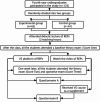Use of virtual simulation for regenerative endodontic training: randomized controlled trial
- PMID: 39962452
- PMCID: PMC11834288
- DOI: 10.1186/s12909-025-06808-5
Use of virtual simulation for regenerative endodontic training: randomized controlled trial
Abstract
Objectives: This study aimed to develop an experimental teaching module based on virtual simulation (VS) to facilitate the instruction of undergraduates in regenerative endodontic procedures (REPs) and to assess its impact on academic outcomes and students' perceptions.
Methods: A REPs-VS platform with detailed diagnostic thinking, treatment protocol, and outcome evaluation scripts we developed. In total, 123 undergraduates in the fourth year were randomly divided into group A (REPs-VS teaching mode) and group B (traditional teaching mode). The effectiveness was evaluated by theoretical and operational examinations. The perspectives of students were assessed via questionnaires.
Results: The total scores of the theoretical and operational examinations in group A were 82.10 ± 14.50 and 90.65 ± 4.81, respectively, which were significantly higher than the control group. Approximately 98.3% of students in group A agreed that the REPs-VS teaching platform improved their knowledge and skills. Most of the students in both groups unanimously acknowledged that the REPs-VS platform effectively enhanced the course's entertainment value and consequently increased their enthusiasm.
Conclusion: The REPs-VS teaching platform established herein is an innovative and practical tool that can enhance the comprehension of REPs among undergraduate students, providing a more robust foundation for clinical practice.
Keywords: Regenerative endodontics; Teaching model; Virtual simulation.
© 2025. The Author(s).
Conflict of interest statement
Declarations. Ethics approval and consent to participate: The authors confirm that the research adhered to the ethical principles outlined in the WMA Declaration of Helsinki for medical research involving human subjects and firmly assert that the study fulfills these principles. The study was approved by the Fujian Medical University Ethics Committee in 2022 (No: 202241). Written informed consent was obtained from all experimental participants. Consent for publication: Not applicable. Competing interests: The authors declare no competing interests.
Figures





References
-
- Widbiller M, Ducke S, Eidt A, et al. A training model for revitalization procedures. Int Endod J. 2018;51(Suppl 4):e301–8. - PubMed
Publication types
MeSH terms
Grants and funding
LinkOut - more resources
Full Text Sources

